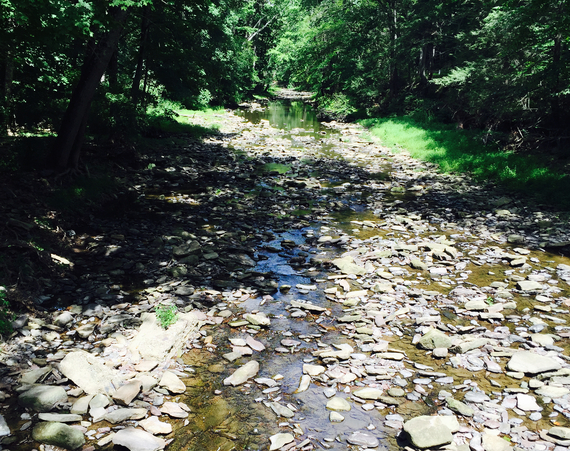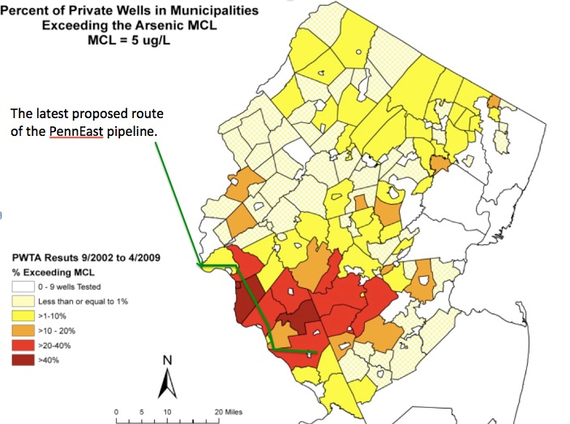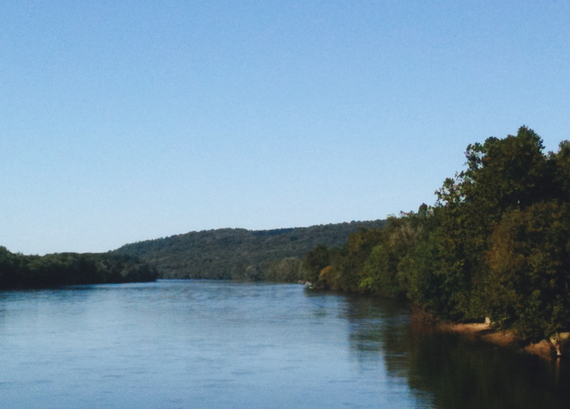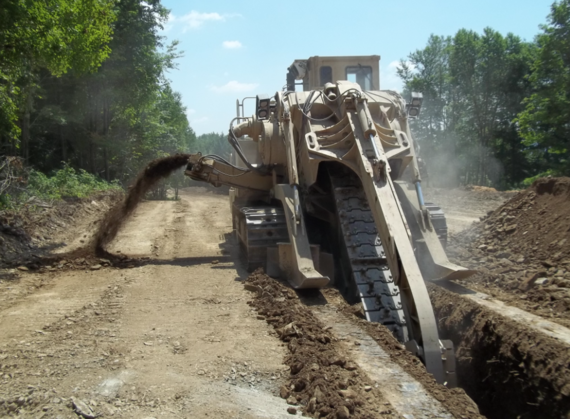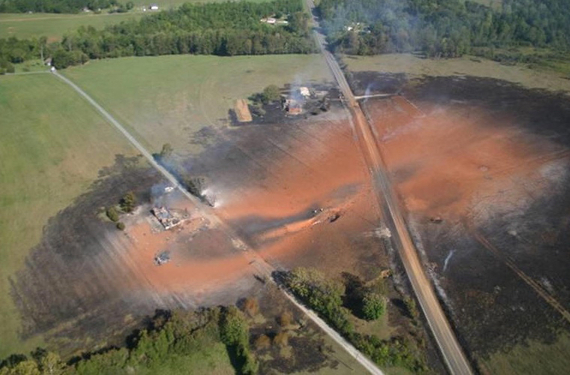"...it is also vandalism to wantonly destroy or to permit the destruction of what is beautiful in nature, whether it be a cliff, a forest, or a species of mammal or bird. Here in the United States we turn our rivers and streams into sewers and dumping-grounds, we pollute the air, we destroy forests, and exterminate fishes, birds and mammal...But at last it looks as if our people were awakening."
Theodore Roosevelt, 1858-1919, 26th President of the United States
"Water will become the blue oil of the 21st Century."
United States Department of State
On a Tuesday evening in late July, Dr. Tullis Onstott, Professor of Geosciences at Princeton University - and in 2007 named one of TIME Magazine's most influential people in the world - stood in front of the Hopewell Township, New Jersey, Board of Health and swore under oath to "tell the truth, the whole truth, and nothing but the truth."
Onstott offered expert testimony citing the potential long-term cumulative impact on New Jersey's regional water supply should the Federal Energy Regulatory Commission (FERC) approve the construction of the proposed $1.2 billion PennEast pipeline slated to carry natural gas 114 miles from the Marcellus Shale in Pennsylvania through the pristine upper reaches of the Delaware River Watershed to a terminus outside Trenton.
Onstott's testimony was sobering.
"PennEast pipeline's proposed path would blast a trench through the heart of a region with the highest arsenic concentration in the state of New Jersey," he said, explaining in detail how the arsenic trapped in the rock beneath the thin soil could be released leading to the loss of potable ground water that supplies the rural and semi-rural communities of three hundred-year-old Hunterdon County; and one hundred-fifty-year-old Mercer County, home of Princeton University and Princeton Theological Seminary.
Arsenic is designated by the Environmental Protection Agency as a known carcinogen, and it is the single largest pollutant of wells and water supplies in the state of New Jersey.
"The proposed pipeline route crosses every aquifer recharge zone that provides drinking water to local communities and every wetland that discharges water into the Delaware Raritan Canal," said Onstott.
"These fractured rock aquifers," he added, "are the sole source of water for the wells of hundreds of communities and farms. The aquifers are extremely sensitive to this type of construction because the six feet deep trench exposes the rock formation to air releasing the arsenic into the shallow water table. Even worse during the pipeline's operation, methane leakage and the current from its cathodic shield will continue to mobilize arsenic for decades to come. There is not that much groundwater here to begin with, and the rainfall in this part of the world is not that great either. Dilution of this arsenic from fresh water recharge will be limited."
He concluded that, "The Federal Energy Regulatory Commission (FERC) and Pipelines Hazardous Materials Safety Administration (PHMSA) need to be made aware that certain types of hydro-geological conditions make large-scale natural gas pipelines fundamentally incompatible with the safety of the communities living near them and high arsenic fractured bedrock is one of them."
"Why?" he asked, "would the PennEast consortium risk the drinking water for thousands of people? They would have had to have been blind not to know this before they proposed their route."
The situation gets worse, according to Michael Pisauro, Policy Director at the Stony Brook-Millstone Watershed, who also testified under oath. "Streams classified as "Category 1" [C1] have been determined by the Department of Environmental Protection (DEP) to be of the highest quality and deserving of the best protection, including stream buffers which are vital to protecting water quality. Trees are crucial in stabilizing water banks and "you cannot remove them without effecting run off," he adds.
After hearing Onstott and Pisauro's testimony, and testimony from four additional experts, a geologist, a medical doctor, a psychologist, and a lawyer, the Hopewell Township Board of Health unanimously passed a resolution, naming "potential groundwater contamination, air quality degradation, surface water degradation and increased risk of physical and mental illness as some of the possible health risks involved," should the pipeline be built. Weeks earlier the Township banned PennEast partner, United Gas Industries (UGI), from surveying after they were discovered drilling bore holes on Baldpate Mountain, in the Ted Stiles Preserve overlooking the Delaware River nor far from Washington's Crossing State Park where founding father George Washington famously crossed the Delaware to fight the Battle of Trenton, crucial to the success of the Revolutionary War.
Because so few landowners have allowed PennEast access to their property, the DEP itself advised PennEast that it could not apply for drilling and construction permits unless it gets more geologic information along the pipeline's route.
"Residents are terrified of losing their drinking water, but also water for their fields and their livestock," says Tom Gilbert of the New Jersey Conservation Fund, noting that the proposed pipeline route "would affect 3000 acres of open space preserved with New Jersey tax dollars, and cross 88 waterways, many federally regulated C-1 blue line streams, the purest designation a waterway can earn."
PennEast Pipeline, LLC, a limited liability corporation, is the umbrella for a powerful consortium of gas companies: Atlanta-based AGL Resources, Houston-based Spectra Energy Partners , New Jersey-based NJR , Long Island/New Jersey-based PSEG, South Jersey Gas Industries, and UGI Energy Services, a subsidiary of UGI Corporation, a global distributor of energy products.
In addition, UGI Energy Services announced plans in May to build a liquefied natural gas (LNG) production facility in northern Pennsylvania to take advantage of the Marcellus Shale gas. Companies liquefy natural gas by cooling and condensing it, which makes it easier to ship over long distances and overseas. The LNG plant, which would include both liquefaction and local storage, is expected to be in full commercial operation by 2017, the same time-frame PennEast has set to complete its pipeline, making PennEast ripe for LNG exports, an assertion PennEast's spokesperson Patricia Kornick has consistently denied.
When Kornick was asked about the negative impacts posed by the pipeline, particularly the potential loss of the only source of potable water for all six townships along the pipeline route, she said, "Please appreciate that PennEast employs a seasoned team of safety, engineering, environmental, geologists and specialists...dedicated to examining all aspects associated with safely constructing and operating the pipeline while minimizing the impact to the community and environment. The team is conducting various studies to ensure it has an accurate understanding of the underlying geology of the proposed route and will assess any risks and develop applicable mitigation measures to ensure safe construction. PennEast is confident it will be able to adequately address these concerns."
A Tale of Two Farms: Part One
"The keywords to understand in Ms. Kornick's response are 'mitigation' and 'adequately address,'" says Jacqueline Haut Evans, of Hunterdon County, a farmer and single mother of three, whose home lies in the path of the current pipeline. She, along with nearly 70 percent of private landowners on the projected pipeline route, has forbidden PennEast surveyors to enter her property.
"If you look up the definition of 'mitigation,' which means 'to cause something to be less harsh or to make it less severe or painful,' you already know PennEast is anticipating problems," she says.
"And," she adds. "If the consortium of companies under the name PennEast needs a 100- foot right of way to accommodate construction of a 36" diameter pipe and a 40 foot right of way permanently thereafter, how will they 'mitigate' the damage to my house with the pipeline currently slated to run next to my front porch? Even if PennEast moves the pipeline into my field, they've already ruined my soon-to-be certified organic farm. How do you 'adequately address' that or 'mitigate' my livelihood and the well-being of my children. I would no longer be able to farm to the extent I am farming and could lose my farmland assessment and organic certification along with the loss of income from breeding goats, ducks, geese, chickens and the sale of eggs, lamb and honey. Any blasting would kill the fish in my pond and require moving my entire farmstead, which I'm not sure is possible, forcing me to carry a financial burden I can't afford."
"I am told," says Evans, "that I would feel the vibration of pressurized gas moving through the pipelines 24 hours a day. It would be a constant reminder that an explosion could happen at anytime. I can't imagine the impact it would have on my children's mental as well as physical health. They would see the destruction of their property from their bedrooms and our front door."
PennEast consistently claims that the pipeline is not only safe, but that it will benefit consumers in southern New Jersey, who are in great need of natural gas. And while the gas itself won't be accessible to the towns through which the pipeline would be built, PennEast claims that the construction and the jobs created will economically enrich the region. Earlier this year, PennEast released an economic report and impact analysis prepared by Econsult Solutions and Drexel University School of Economics whose purpose is to "quantify the economic benefits resulting from the Project."
Says the report: "The immediate construction and labor impacts of the Project are substantial and would greatly benefit local communities through construction, labor and project management jobs."
Potential Loss of Property Values
Mercer County, New Jersey, resident, Jeffrey R. Shafer, PhD, a former economist in the Federal Reserve System and former Assistant Secretary and later Undersecretary of the U.S. Treasury for International Affairs, rebuts the report, saying that "loss of property values (for affected landowners and their neighbors) is likely to be very large. The communities through which the pipeline would run in New Jersey are fundamentally different from those developed areas where economists have found relatively small valuation effects. For more than three decades this area has attracted those looking to preserve a small area of traditional farms and forest in the dense urban corridor between Washington D.C. and Boston. Much land has been preserved or protected through a range of programs, which have been paid for by contributions and by transfers of tax burden to other landowners in the community."
"Landowners, both farmers and residents," he adds, "who have not entered these programs value and protect the land that they own. The result is a community in which the value of its special character is capitalized in property prices. Buyers looking for an undeveloped haven would not be attracted to the area where the pipeline runs and this value would be lost. And this pipeline cannot be taken in isolation. Other pipelines and development projects would add up and fundamentally change the character of the entire area."
Michelle Byers, Executive Director of the New Jersey Conservation Foundation, echoes Shafer's concerns. On the Foundation's website she addresses the fact that the state of New Jersey is currently updating its master energy plan. Instead of 12 new pipelines proposed to bisect the state, she calls for a larger investment in renewables. "There is not clear documentation that these new gas pipelines are needed in New Jersey. In fact, the opposite is most likely true," she says.
"A recent analysis conducted by Labyrinth Consulting Services - found that the proposed PennEast pipeline alone would result in a 53 percent surplus beyond current demand in Pennsylvania and New Jersey, and concluded that gas is bound for other markets, including export overseas. The current rush to build multiple pipelines in New Jersey runs the risk of significantly over-building, resulting in supply that far exceeds actual needs."
In the report, petroleum geologist and energy expert, Arthur E. Berman says, "Based on current natural gas supply and demand in New Jersey and Pennsylvania, there is no apparent need for gas that would be transported via the PennEast pipeline."
A Tale of Two Farms: Part Two
Angele and Brant Switzler's 50-acre farm in Delaware Township, Hunterdon County, has been in the family for three generations, a farm they share with extended family. In early August, beneath a deep blue sky, Switzler sits in her living room as a PennEast survey plane circles her property taking photographs, making a loop over the neighborhood and returns, cutting the still air with an insistent loud drone.
The Switzler's farm is a working farm with a fruit orchard and a large daylily field in cultivation for eventual sale of individual plants. The Switzlers rely on solar panels for electricity and a carbon capture wood burning stove for heat in the winter. According to PennEast's proposed route, the pipeline easement would cut through the orchard, the daylily field, and the solar panels.
On May 15, Switzler, a gifted painter trained at the Academy of Fine Arts in Philadelphia, woke up with what she assumed was another migraine. "The headaches had been occurring on a regular basis since I first became anxious and threatened by the prospect of the PennEast Pipeline cutting through the entire length of my property, destroying a woodland and wetland in addition to farmland," she says.
Switzler, like her neighbors in rural Delaware Township has refused surveyors access to her property. "In April the survey company called me every day," she says. "A man with a southern accent kept telling me that he had very important new information I should know, information I would be privy to, only when I allowed them to come survey. Even more upsetting, at a PennEast informational dinner in April, a land agent showed me a map of the route through my property in which they had deleted my house."
"It was doubly upsetting," she adds. "Because at an earlier meeting, I sat down with another land agent and went through a map of my property with him. And that map contained my house. We marked what was important to my husband and me - a 150-year-old oak tree, the orchard, the solar panels, the location of my well and where my septic system is buried - with yellow arrows and noted everything with the coordinate.
The second land agent who told me my house was missing wasn't even fazed by the deletion. He simply said, 'Well Google Earth doesn't always have the house on it.'"
"How is that possible when my house predates Google Earth?" she wonders. "The agent said that unless I let them on my property they might well use a Google Earth map, threatening by implication that they might route the pipeline directly through my house. It is unfathomable that in order to explain the stress and sorrow this has put on my husband, my kids and myself, I have to remind pro-pipeline advocates what "home" means to most people. Home is sometimes the only investment and financial security a family like ours has."
Switzler's headache was not a migraine, but a brain hemorrhage, which left her paralyzed and in the hospital for eight weeks. "Ironically," she says, on the day I returned home from the hospital, three surveyors were at the edge of my property with survey equipment.
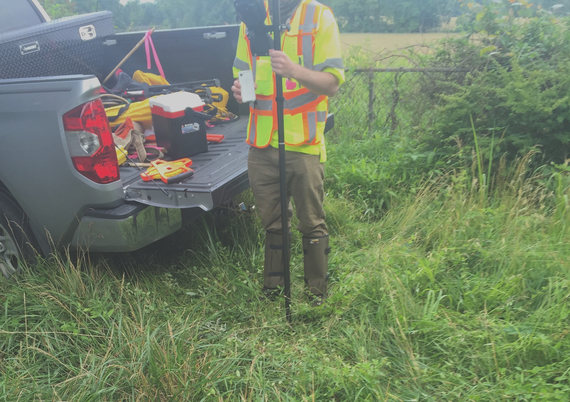
Surveyor on the Edge of the Switzler Farm
70% of Landowners in New Jersey Have Refused Survey Access to their Properties
Switzler, who now walks unsteadily and has lost some of the fine motor skills she needs to paint, adds, "It has always been clear to impacted land owners that this is nothing more than a company saying, 'We stand to make millions of dollars from fracked gas. Your land is in our way. We will lobby the Federal Energy Regulatory Commission to give us permission to use Eminent Domain, so that we can take your land and there is nothing you can do about it. We don't have to concern ourselves with your rights or feelings. So comply.'"
At issue, she adds, "are some of the most fundamental rights of citizens - the right to own property, the right to clean water and the right to protect natural environments. Each time land grabs occur, precedents are being set. There are 12 pipelines in the works in New Jersey. Other energy consortiums are following the PennEast project with interest. I was not on the route a month ago, and I might not be on the route ultimately. This is a moving target. The process is an expedited farce in favor of gas companies, not citizens."
As the scoping process continues, all the townships along the Delaware River are listening to her and her neighbors. At the Delaware Township meeting held on August 10, the room was filled to overflowing with residents of all ages. Following the example of every single township in New Jersey in the path of the pipeline, the Delaware Township committee presented a resolution. Among the points were these:
1. The taxpayers of 36.67 square mile rural Delaware Township, one hour from New York City and one hour from Philadelphia, in partnership with County, Federal and non-profit agencies, has invested $15, 414, 546.60 in the preservation of 2,146 acres of open space and farmland that is treasured by thousands of visitors each year from neighboring states and across the country, giving a boost to the economy and to the local farms and restaurants.
2. New Jersey Conservation Foundation, who has partnered with the township in preserving open space, learned that PennEast surveyors entered land owned by the Foundation and Hunterdon Land Trust without the permission of the owner. On July 30, the Foundation issued an order to "cease and desist unauthorized entry and survey activities.
After hundreds of meetings in which neighbors got to know and respect one another for their love of one of the most historic and beautiful places in the U.S., and for their pragmatic response to a pipeline they believe is redundant; and with an understanding that the battle to save their land will ultimately rest with the Federal Government, a cheer rippled through the room when the Delaware Township Committee unanimously passed its resolution to deny PennEast survey access on any and all Township-owned lands.
PennEast plans to submit its formal application to the Federal Energy Regulatory Commission in September.
"I painted "Artifact" in my studio on my Hunterdon County farm," says Angele Switzler. "It's a representation of a very small arrowhead I keep there. This arrowhead is of significance to me because my father is Wasco Indian, raised on the Warm Springs Indian Reservation in Central Oregon. The arrowhead is presented rising from the river as a totem to the universal truth that in order to survive, we must become engaged in and connected to our environment. For our environment, like my farm, binds us to our forefathers and mothers and becomes our legacy to our children."
Editor's Note: The resolution went to, among others, Governor Chris Christie, Senators Robert Menendez, Cory Booker and Christopher Bateman, Congressman Leonard Lance, Assemblywoman Donna Simon, Assemblyman Jack Ciattarelli, the New Jersey Department of Environmental Protection, the New Jersey State Agricultural Commission, Hunterdon County Board of Chosen Freeholders, Mercer County Board of Freeholders, Hunterdon County Agriculture Development Board, affected communities in Luzerne, Carbon, Northampton and Bucks Counties in Pennsylvania and Hunterdon and Mercer Counties in New Jersey, the New Jersey League of Municipalities, the Delaware Riverkeeper Network, the Hunterdon land Trust and the Delaware Township Citizens Against the PennEast Pipeline (DTCAPP).
Joy E. Stocke writes frequently about environmental issues. She is the founder and Editor in Chief of the online magazine, Wild River Review.

